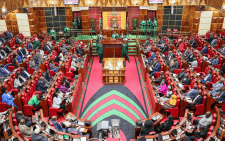Confusion shrouds the rollout of UHC

Universal Health Coverage (UHC) is an ambitious programme that is expected to guarantee access to quality health care by all Kenyans.
But with only about five days left before President William Ruto’s administration rolls out the much-hyped scheme, there is little on the ground to show the anticipated transformation.
Despite all the hype, the rollout is shrouded in confusion, with medics raising concerns about the government’s preparedness.
The idea for UHC began more than 18 years ago but flopped after piloting in Isiolo, Nyeri, Machakos and Kisumu in 2018.
Though Heath CS Susan Nakhumicha has been vocal in selling the UHC agenda, saying it failed previously due to a lack of laws to put it to effect, public health facilities look ill-prepared, raising fears that the scheme could soon run into the same problems that faced earlier efforts.
Besides the legal backing that is now in place, going by past experience, the national government needed to increase the budgetary allocation to the health docket and ensure the funds are devolved, increase the healthcare workforce and streamline the referral system, especially from county to national hospitals.
Instead, the government reduced the allocation to health by almost Sh11 billion, raising alarm among health advocates and citizens alike, who worry that reduced funding will exacerbate existing healthcare challenges and hinder the rollout of Social Health Insurance (SHI).
Besides the ongoing registration of Kenyans in the new health scheme that will replace the National Hospital Insurance Fund (NHIF) and the hiring of the more than 100,000 community health promoters, the government has not made any efforts to address one major challenge facing the healthcare system - inadequate resources and funds from the national government and understaffed health facilities.
Embarking on SHI without modernising the infrastructure in public hospitals is self-defeating. Existing facilities have not been improved, and there is chronic under-investment in public facilities, including infrastructure, staff and medicines.
Kenyans seek healthcare in private hospitals because of limited access to essential drugs, treatment, medical expertise and resources in public facilities, an issue that has not been addressed either.



